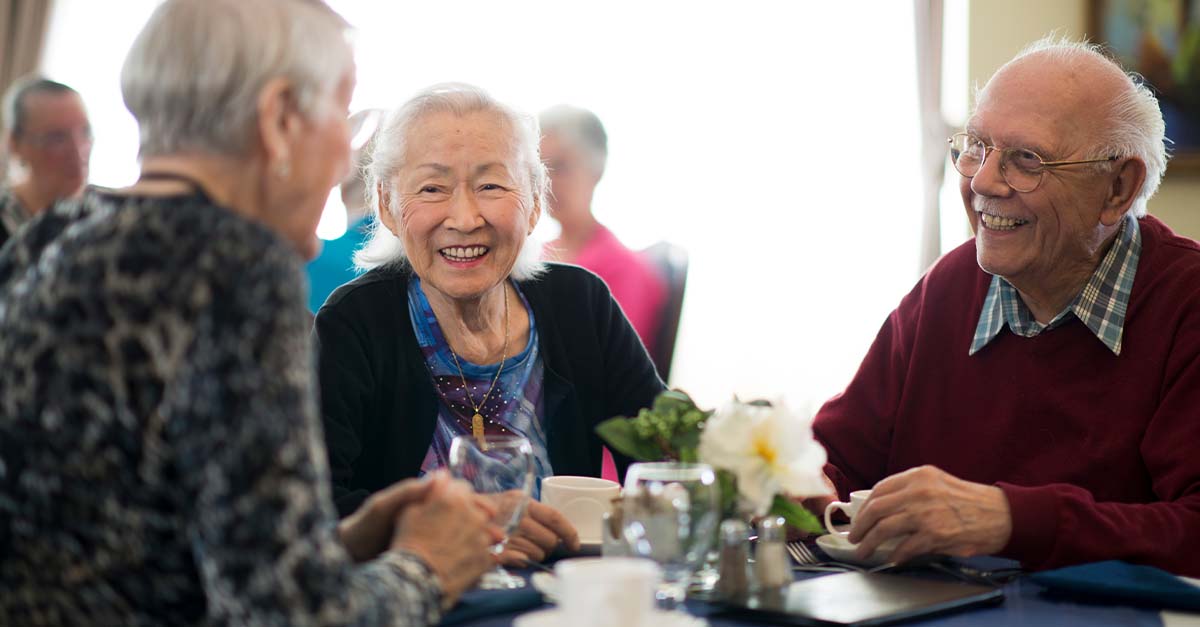Respite is a short-term care option for older adults who want to try out senior living full-time, give their caregivers time off or need a place to recover after a surgery. Read on for some of the benefits that respite can provide as the holiday season approaches.
What’s included in respite?
Before we launch into all the reasons respite might be a good option for older adults, let’s delve into some of the services that respite providers typically offer.
A fully furnished apartment
Choosing respite means that older adults only have to bring clothes or other personal items – all the furniture and accommodations are already set up for them.
Engagement
Senior living communities provide a space for older adults to stay connected with one another, with their families and with staff.
Assistance with activities of daily living
Trained staff members assist with eating, bathing, dressing, medication management and other essential tasks that must be completed every day.
Dining experiences
Culinary teams prepare dishes – or incorporate doctor-recommended foods into meals – up to three times a day. Some senior living providers also offer table service with locally sourced ingredients.
All these services might be performed in a senior living community, among other places. If you’re noticing that daily tasks are becoming more difficult for your parent, consider talking to a senior living community to see whether they offer short-term stay options. If they do, trying a short-term stay may be a great way to explore the start of your family’s next chapter.
Prevent the spread of flu and cold
An added benefit of respite during winter is that it can minimize the transmission of the flu and common cold. If a family member who is acting as a caregiver comes down with a fever but still has to bathe or cook for an older adult, that older adult may catch the caregiver’s virus – which can be a serious health concern for seniors. A respite worker in a senior living community who is flu-free, however, could perform the same functions while reducing the chances of spreading illnesses. Additionally, respite workers in a senior living community may set up vaccination clinics, which can help curb the prevalence of any viruses in that community.
Ward off those winter blues
All the evenings spent indoors during the winter can make anyone feel isolated and melancholic. A case of the winter blues is distressing enough, but for people living with dementia, those symptoms can manifest in a condition called “sundown syndrome.” As many as 20% of individuals with Alzheimer’s have sundown syndrome, which may lead to anxiety, mood swings and delusions. Luckily, a professional at a senior living community can help older adults keep active and engaged with other residents – which can provide immense health and cognitive benefits.
Care for the caregivers
Caregivers often fulfill their roles out of deep-rooted love and fidelity, but – like everyone else – they need time off to recharge and reset. Respite can help caregivers spend time with other friends and family, catch up on sleep, go to appointments with their doctors or vacation in a warm climate during the winter to restore their energy.
Choose Atria this winter
The abundant activities and delicious culinary options available in Atria communities make them delightful places to call home year-round. But over the next few months, consider looking into our short-term stay options where guests enjoy a sampling of resident life. The accommodations include weekly linen services, private apartments with alert systems, a vibrant social calendar, transportation to and from appointments and chef-prepared meals in the dining room or with room service. Stay as long as you’d like – and enjoy the warm ambience of Atria this winter.
You might also like
Want to learn more about life at Atria Senior Living?


